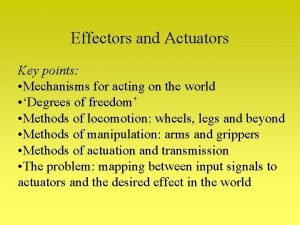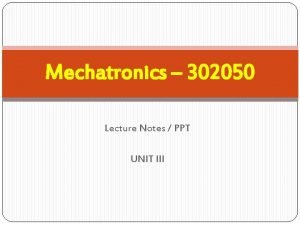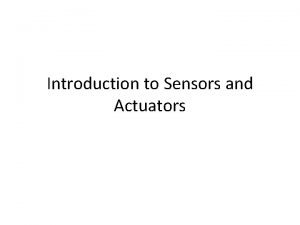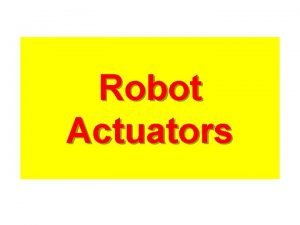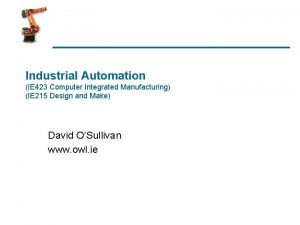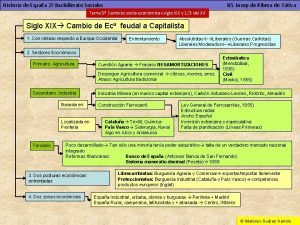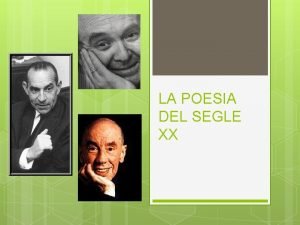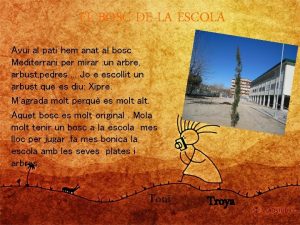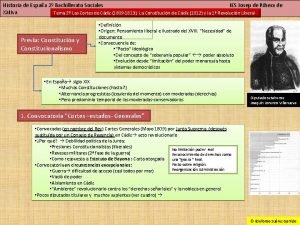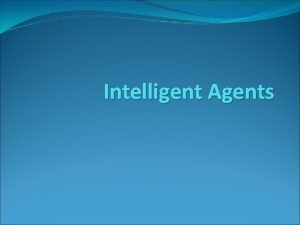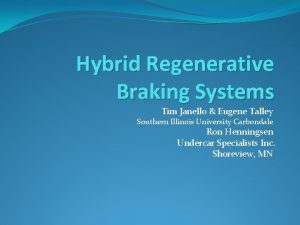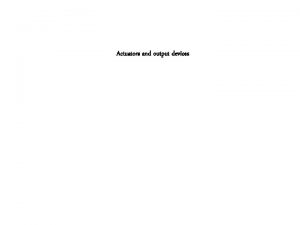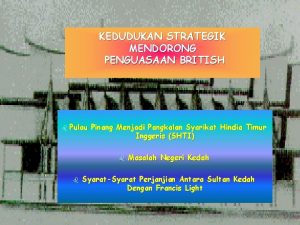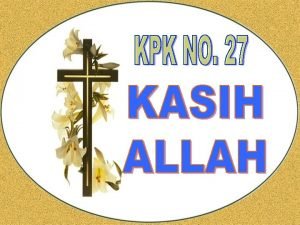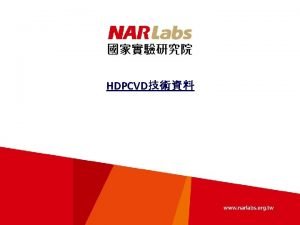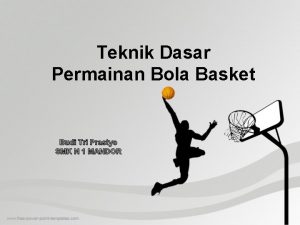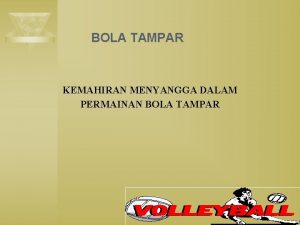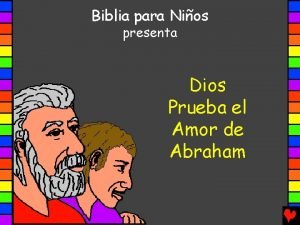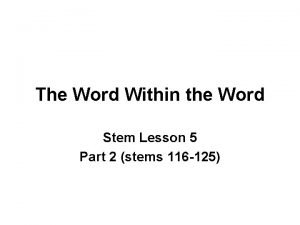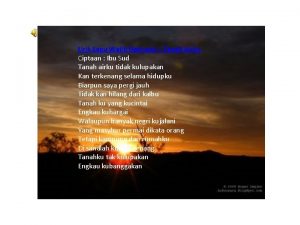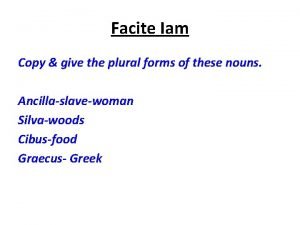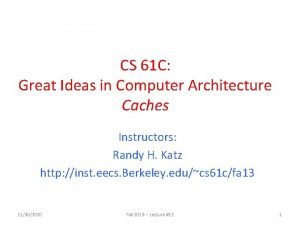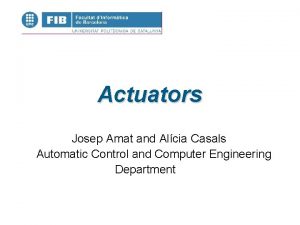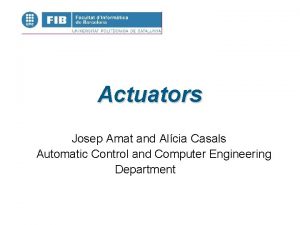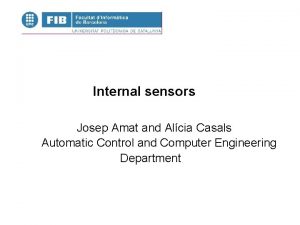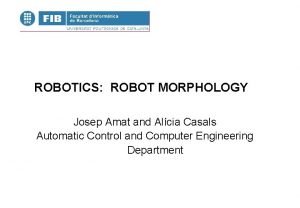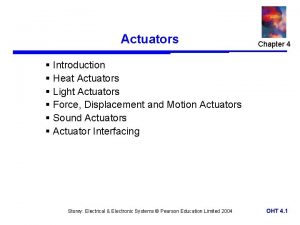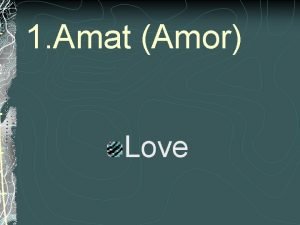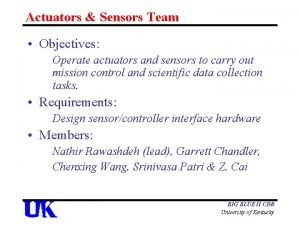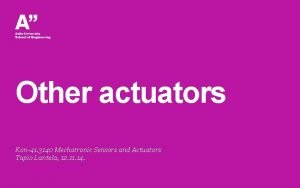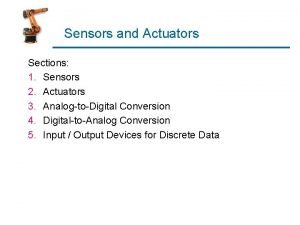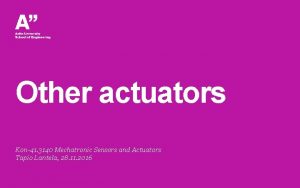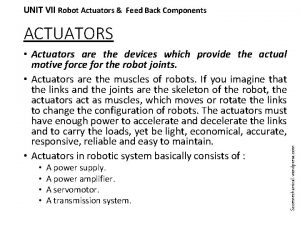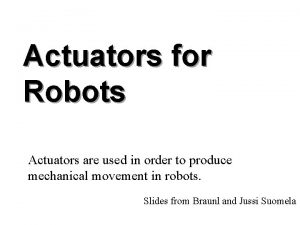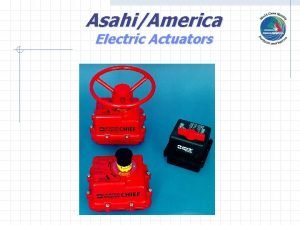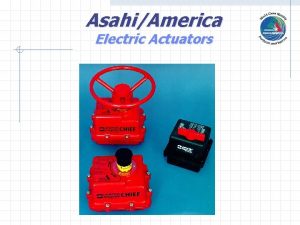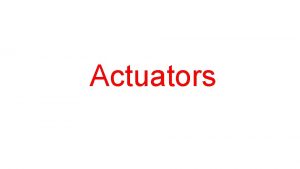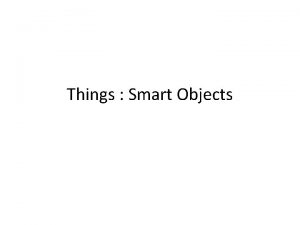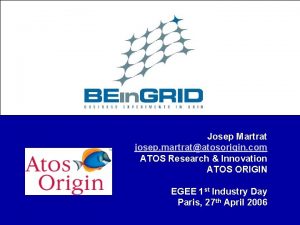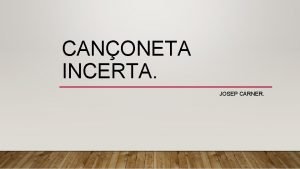ELECTRICAL ACTUATORS Josep Amat and Alcia Casals Automatic
























- Slides: 24

ELECTRICAL ACTUATORS Josep Amat and Alícia Casals Automatic Control and Computer Engineering Department

ACTUATORS 1 – Pneumatic actuators Cylinders Motors 2 – Hydraulic actuadors Cylinders Motors 3 – Electrical actuators D. C. motors. A. C. motors Steeper motors.

D. C. Motors. F Force. H I Motor

D. C. Motors. Motor torque with a one turn coil Motor torque with two turns coil Brushes Motor torque with multiple turns coil

Casing Stator Rotor

D. C. Motors. Stator (Inductor) Rotor (Induced) Serial excitation Parallel excitation

D. C. Motors. I Stator V = I· (Re + Rr) + Vcem T = K I ·F I V Vcem = Kv· w T Tr V 1 w v 2 w. O , Serial excitation w. O

D. C. Motors. I Stator V = I· (Re + Rr) + Vcem T = K I ·F o V Vcem = Kv· w T V 1 V 2 Permanent magnet dc motor Tr w w. O

D. C. Motors. Control techniques PWM

A. C. Motors. 50 Hz. 3. 000 r. p. m. 50 Hz. = 50 r. p. s x 60 = 3. 000 r. p. m. Triphasic voltage produces a rotator magnetic field that steers the rotor, if it is a magnet

A. C. Motors. ac F 0 = 50 Hz. The permanent magnet triphasic motor has a constant speed. Synchronic motor

A. C. Motors. Control techniques ac/dc dc/ac f The speed of a triphasic motor with permanent magnet rotor can be controlled by varying the frequency of the feeding signals.

A. C. Motors. +V 0 V AB A B Control technique: using a dc / ac converter

Electrical Actuators DC Motors. AC Motors. Stepper Motors Synchronous Asynchronous (Induction)

U V W V V S N U U W W Synchronous A. C. Motor the rotor is a permanent magnet i Induction motor (asynchronous), the rotor is composed of one or more windings in short-circuit

Rotor of an asyncronous a. c. motor (Rotor as squirrel cage)

A. C. Motor. D. C. Motor. T T Tr v 2 V 1 w 1 A B (Synchronous) w. O f 1 w w 1 Tr w

A. C. Motor. D. C. Motor. T (Synchronous) T Tr V 2 V 1 w 1 U V Tr w. O W w w 2 w 0 w f 0 = 50 Hz.

Stepper Motors S S N S S S N N N S N N Control of the position of the rotor in a stepper motor using multiple pole pairs

Stepper Motors N S S S N S N N N S N Reduction of the number of pole pairs to a minimum, groups of three that share the same coils: Three phases stepper motor

Stepper Motors N S S N S N N S S S N S Stepper motor control in three phases N S N

Stepper motors. 0 N S N S N S N S N S N S N S N S N S N 1 S N S N S N S N S N S 1 0 S N S N S N S N S N S Control of a two bodies stepper motor of two phases

Internal structure of a two bodies stepper motor, of two phases

Stepper Motors. Control techniques of a two phases stepper motor
 Ariadna mas casals
Ariadna mas casals Actuators and effectors
Actuators and effectors Sensors and actuators lecture notes
Sensors and actuators lecture notes Difference between sensors and actuators
Difference between sensors and actuators Advantages of hydraulic actuators
Advantages of hydraulic actuators Ie 423
Ie 423 Ies saavedra fajardo historia de españa
Ies saavedra fajardo historia de españa Josep antoni fluixà
Josep antoni fluixà Escola josep ferra i esteve
Escola josep ferra i esteve Ies saavedra fajardo historia de españa
Ies saavedra fajardo historia de españa Peas model ai
Peas model ai Toyota highlander brake bleeding sequence
Toyota highlander brake bleeding sequence Actuators input or output
Actuators input or output Kedudukan yang strategik
Kedudukan yang strategik Kasih allah amat besar lirik
Kasih allah amat besar lirik Applied materials centura generation
Applied materials centura generation Ketombe memang amat menjengkelkan
Ketombe memang amat menjengkelkan Foot fire dribble
Foot fire dribble Kemahiran bola tampar
Kemahiran bola tampar Amat madre de abraham
Amat madre de abraham Maksud sajak harga remaja
Maksud sajak harga remaja Words with the stem dec
Words with the stem dec Lirik lagu nasional berkibarlah benderaku
Lirik lagu nasional berkibarlah benderaku Copy plural
Copy plural Amat computer architecture
Amat computer architecture

